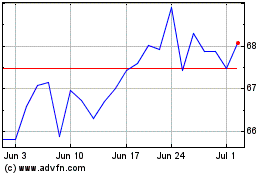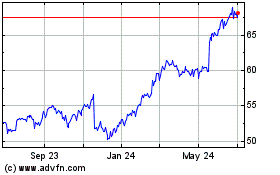Facebook Bets $5.7 Billion That Mobile Giant Holds Key to India
April 22 2020 - 11:13AM
Dow Jones News
By Newley Purnell
Facebook Inc.'s $5.7 billion tie-up with an Indian mobile leader
could create a new kind of animal in the world's biggest untapped
digital market: a social media behemoth wedded to a mobile
infrastructure titan -- both coveting e-commerce.
Now the two companies are expected to square off against some
formidable online shopping rivals: Amazon.com Inc. and Walmart
Inc., which have each invested billions in the South Asian
market.
Facebook's deal, announced Tuesday, is its largest foreign
investment, forging a partnership through a 9.99% stake in Indian
telecommunications operator Jio Platforms Ltd. Facebook shares were
up 5% Wednesday.
The Indian firm's subsidiary, Reliance Jio Infocomm Ltd., has
upended India's mobile sector by spending billions to build a
nationwide 4G network and offer dirt-cheap data plans, which
hundreds of millions of poor Indians have used to enter the
internet economy for the first time.
The union provides the heavily indebted Jio with not just cash,
but also access to Facebook's expertise in reaching consumers and
using their information to sell ads. It also brings Reliance closer
to Facebook's WhatsApp, a ubiquitous platform for Indian consumers
just getting online. India is WhatsApp's biggest market, with more
than 400 million users.
Access to the platform could be a boon for Jio as it pushes
forward with an ambitious plan to dominate e-commerce in the rural
regions where most Indians live and it is trying to partner with
millions of India's small mom-and-pop grocery stores. Consumers,
for example, could use WhatsApp to purchase products from
neighborhood shops, which Jio has been signing up via low-cost
point-of-sale machines.
"E-commerce will happen in a very localized way" in rural India,
said Tarun Pathak, an analyst with research firm Counterpoint. It
will happen not on PCs but on inexpensive smartphones and, "The
familiarity is there for WhatsApp," he said. "It makes sense."
Reliance can also tap Facebook's expertise in consumer products,
on display not just in WhatsApp but in Facebook-owned Instagram and
Facebook's own platform, as it builds out its new offerings in
video and music, analysts say.
In return, Facebook gets not just a foothold into rural India,
but a powerful local ally. Reliance Industries, Jio's parent, is
controlled by India's richest man, Mukesh Ambani. Mr. Ambani's
conglomerate has interests ranging from retail to natural
resources, and his company is renowned for its clout with
regulators and a countrywide network of managers that can roll out
massive projects in highly-regulated industries.
"It's a partnership of Facebook's product and Reliance's
distribution muscle and might," Jayanth Kolla, founder of research
firm Convergence Catalyst, said of the deal. "Reliance has shown
through Jio that it can penetrate the length of breadth of this
country extremely fast, and Facebook has struggled to penetrate the
long-tail, billion Indians," he said.
Facebook's attempt to provide a no-cost telecommunications
service dubbed "Free Basics" was rejected by the Indian government
in 2016, and it has been waiting since 2018 for permission to roll
out a trial digital payments service for WhatsApp. New Delhi has
also been increasingly hostile to foreign tech firms, tweaking
rules in ways that benefit local players.
Mr. Ambani in a video message released Wednesday said the deal
reflected the "combined power" of Jio's network and Facebook's
"intimate relationship with the Indian people." He suggested that
Reliance's push to get grocery stores online could be followed by
efforts to connect small and medium-size businesses, students and
teachers, health-care workers and more.
Small businesses "are the core of every economy and they need
our support," Facebook Chief Executive Mark Zuckerberg said in a
post on his personal Facebook page when the deal was announced.
Amazon is investing $5 billion to expand its India operations,
and Walmart in 2018 acquired India's biggest homegrown e-commerce
firm, Flipkart, for $16 billion.
While the Reliance group is one of India's largest retailers --
largely through a network of local and international brands it has
bought -- it has yet to prove itself in e-commerce. However its
popular mobile service as well as its affordable phones give it a
powerful springboard onto the screen time of those new to the
internet in India. Its streaming video service, JioTV, for example
quickly became one of the most watched in India because it was part
of the Jio ecosystem.
Forrester Research Inc. projects Indian e-commerce sales to more
than double to $68.4 billion by 2022, from $26.9 billion in 2018.
Roughly half of India's 1.3 billion have yet to get online, but
they are expected to start transacting online when they do.
India is a promising market for internet companies such as
Alphabet Inc.'s Google, which is a digital advertising powerhouse
and built a special digital payments service for the country. The
company's YouTube platform is hugely popular. Ride-hailing company
Uber Technologies Inc. has been scrambling to lure riders and
drivers, and Netflix Inc. and Spotify Technology SA are catering to
Indian users.
Write to Newley Purnell at newley.purnell@wsj.com
(END) Dow Jones Newswires
April 22, 2020 10:58 ET (14:58 GMT)
Copyright (c) 2020 Dow Jones & Company, Inc.
Walmart (NYSE:WMT)
Historical Stock Chart
From Mar 2024 to Apr 2024

Walmart (NYSE:WMT)
Historical Stock Chart
From Apr 2023 to Apr 2024
